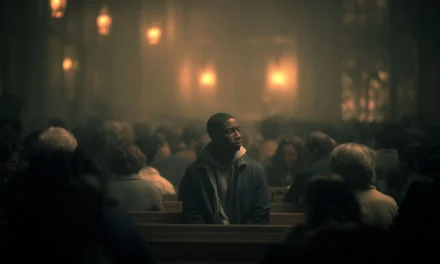Sometimes, leaving the church doesn’t feel like a decision—it feels like something that happened to you quietly, over time.
You weren’t asked to leave. No one rebuked you. There was no meeting, no confrontation. But there was a shift.
People stopped reaching out. Invitations faded. Conversations happened around you, not with you. The leadership that once welcomed you with warmth now met you with silence—or polite distance. And even though no one said the words, the message came through loud and clear: You don’t belong here anymore.
That’s the thing about spiritual exclusion—it doesn’t always come with a door slammed shut. Sometimes, it comes with an exit sign no one admits to installing.
And once you’ve seen it, it’s hard to unsee. The more you try to engage, the more you feel like your presence is uncomfortable. That your questions are a disruption. That your discernment is a liability.
Eventually, you stop asking, “Should I go?”
You start wondering, “Why does it feel like I already have?”
The Fear That Keeps People Out
In one church, a woman who had once been deeply involved began to notice something was different. She hadn’t broken any rules. She hadn’t committed any visible sin. But her relationships with leadership grew tense. Invitations stopped. Meetings continued without her. Her presence, once welcomed, became quietly avoided.
Eventually, she received word—not through conversation, but through exclusion—that she was no longer considered safe. No charges. No process. Just a shift.
What she experienced has a precedent.
In Acts 9, shortly after Saul’s radical conversion, he tried to join the disciples in Jerusalem. He was no longer persecuting them—he was one of them. But they didn’t believe him.
When he came to Jerusalem, he tried to join the disciples, but they were all afraid of him, not believing that he really was a disciple. — Acts 9:26
There was no meeting. No formal decision. Just fear. Just silence. And the result? Saul stood on the outside, not because he rejected the church—but because the church didn’t know what to do with him.
Sometimes, the church doesn’t know how to hold transformation.
Sometimes, it fears disruption more than it welcomes redemption.
Sometimes, it slowly edges people out—not because of sin, but because of tension.
But what happens next in the story matters. Barnabas stepped in. He listened. He believed. He brought Saul back into community—not to protect the system, but to honor the truth.
Jesus always finds the ones on the edge of the circle.
And He sends others to go with them—to remind them: You may have been pushed out by people, but you are still held by Me.
When Silence Isn’t the End of the Story
It’s hard to explain to others what happened when there was no official moment. No dramatic scene. Just a growing sense that you didn’t belong anymore.
That’s what makes this kind of spiritual exile so hard to grieve—there’s nothing tangible to point to. No clear wrong. No goodbye. Just a slow erasure that leaves you wondering if you imagined the whole thing.
But the pain is real. And so is the pattern.
You were there… until you weren’t.
You mattered… until you made someone uncomfortable.
You were celebrated… until you saw something they didn’t want to name.
But here’s what’s also true: Jesus does not use social silence as a substitute for spiritual discernment. He doesn’t shut down dialogue with His people. He doesn’t quietly walk away from the ones He died to save.
When others create distance, Jesus draws near.
When institutions fade people out, Jesus finds them on the fringes.
When leaders hesitate, He steps in with clarity: I see you. I still want you. I never left.
If you’ve been pushed out without words, let this be the truth that replaces their silence:
You may have left the building, but you are still on holy ground. Because He walked out with you.
What Their Silence Didn’t Say
One of the hardest parts of being pushed out is that there’s often nothing to hold onto—no statement, no confrontation, no goodbye. Just silence. Just space. You didn’t leave because you wanted to—you left because something in the atmosphere told you there was no place for you anymore.
And even though no one said it out loud, you still carry the weight of what wasn’t said. You replay conversations, retrace moments, wonder if you misunderstood or overreacted. But deep down, you know what it felt like: your presence became a problem, and their silence became the answer.
But here’s what their silence didn’t say: it didn’t say who you are. It didn’t say what God thinks of you. It didn’t cancel your calling, your faith, or your place in the Body of Christ.
When others fade away, Jesus draws near. When the community shrinks back, He makes room. You may have felt invisible in the church—but you are still seen by the One who calls you by name.
And for some, that silent push becomes the moment they realize: I didn’t leave because I was unfaithful. I left because staying would have meant disappearing completely.
In the next article, we’ll talk about what happens after you’ve left—when the silence turns to absence and Sunday morning feels hollow. We’ll explore the ache of disconnection and the quiet strength it takes to sit through The Loneliness of Exile: Surviving Your First Sunday Away.
Devotional Song
Listen before, during and after reading the devotional.












Recent Comments